Rod Lorie Nothing But the Truth Interview
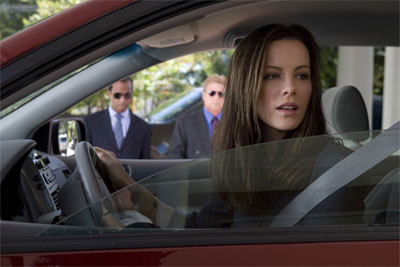
ROD LURIE RETURNS TO CINEMATIC POLITICS.
EXCLUSIVE Rod Lorie, Nothing But the Truth Interview by Paul Fischer.Ex-critic and journalist Rod Lurie is at his best when it comes to exporing cinematic politics, from The Contender to his short-lived TV series Commander-in-Chief. He returns to the political fray with his powerful new drama, Nothing but the Truth, in which Kate Beckinsale plays a reporter whose story results in the outing of a CIA agent, and refuses to reveal her source. In this exclusive interview, the acclaimed and outspoken director talks about the film's reality, politics and what it was that led to the downfall of Commander-in-Chief.
QUESTION: What is it about you and politics that make such good bedfellows?
ROD LURIE: Well, you know, I grew up in a political household, because my father was a political cartoonist, yeah? And so, you know, we had Governors and Senators walking in and out of the house all the time. So while other kids were reading about baseball scores, I was worried about who was going to win the primary on Tuesday nights. I just really enjoyed it and I think anybody who watched the campaign between Obama and Clinton and Obama and McCain, how entertaining it was, realizes that politics doesn't have to be boring at all, that politics can be an extraordinarily exciting, fu**ing contact sport.
QUESTION: When you read about the Plame case, the CIA outing, was that something that struck you as being an interesting springboard for a film?
ROD LURIE: Yeah, it really did, Paul, but I have to tell you that in fact, the genesis actually came out - I was on a TV series that I created called Commander-In-Chief where I had this idea about the reporter who was doing the story about Geena Davis, that had classified information. Consequently he gets thrown in jail for protecting his source and the twist was going to be that Geena was going to pardon that person, because in this country, even though you write badly about me, we don't jail journalists. Then I got fired from the show on October sixth of 2005, and they brought in Steven Bochco, who proceeded to take a blowtorch to every single idea I had, including that one. That was my favorite idea going on and I wanted to do a journalist-in-jail story. It so happened that not shortly thereafter, I think Judith was in jail, or her story was coming out and what I just asked myself was, what if the reporter and her subject both had kids that went to the same school and what could be the result of that? So really, the story between Miller and Plame did become a bit of a pain in the butt for me, because so many people think that's what this movie is.
QUESTION: It deals more with First Amendment issues, and the rights of journalism. It's really about what it's like being a political journalist.
ROD LURIE: Yeah. I think that's exactly correct and as you can see, it places somebody in the same situation that Miller and Plame were in, to a certain degree, but these characters are not based on them at all. I know nothing about Judith Miller, and I know nothing about Plame. I never read her book. The only thing I know about her is that she's good-looking. Other than that, I'm at a bit of a fog as to who she really is.
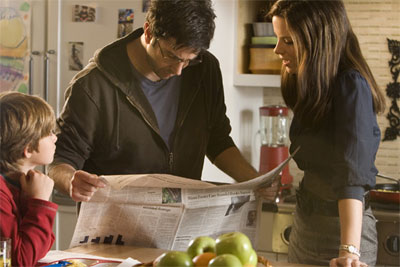 QUESTION: And you went out of your way not to meet her, and presumably nobody else met anybody.
QUESTION: And you went out of your way not to meet her, and presumably nobody else met anybody.ROD LURIE: Nobody met Plame. Kate broke bread with Judith Miller, because what she was curious about was her incarceration: What it's like for a reporter to be in jail? But she wasn't there to look at her mannerisms.
QUESTION: So, what were the challenges for you in structuring this script to insure that this wasn't perceived as being a film that was going to hit audiences over the head with a sledge hammer, as it were? That you went out of your way not to be too judgmental?
ROD LURIE: I've read many critics about my work in the past. And they always say a lotta good things, but the one sort of constant negative has been that I'm overly sentimental, and that I sanctify my leads a little bit too much. I know I'm not supposed to give a fu*k what you guys say, but I do and especially when you're right. So I went out of my way to make this as not sentimental a movie as I could. Hence, you know, you don't have any sentimental music in the movie at all. I've also tried to create some cracks in the armor of goodness in the lead character. One of the first things that we hear her saying is, you know, "We're going to bring down this administration with this story." And it appears that she's motivated by some sort of partisanship, which is not a quality that an investigative reporter has at all. And when her husband comes to see her for a conjugal visit, you sort of empathize with him. You sort of understand why he's losing faith and love in her. That maybe she's putting profession first above family. Which is not, necessarily, in this country, at least, a desired characteristic to have.
QUESTION: There's a difference, though, between sentiment and humanity. Where do you draw the line between avoiding sentimentality, but at the same time insuring that your protagonists remain deeply human?
ROD LURIE: Well, I think that you have to rely on the quality of the screenplay and the quality of the performance. That if the person can play it real, then you're going to naturally get some emotion out of it. It's when we don't have enough faith in our work that we - you know, that we lay on the saccharine with the music, or with a certain kind of lighting. You know, at the end of the film, she says goodbye to her boy. Or, toward the end of the film. Without giving anything away and the discussion that they have is almost like a discussion between two adults. And, you know, both Kate and I were always wondering whether or not there should be a bigger hug, a bigger, "I love you," or whether or not she needed to explain herself in a specific way that - you know, would be maybe perhaps more touching. But we just relied on the fact that the audience would be with her to such a degree at that point, that they would emphasize with her. That was a scene, for example, with no music in it.
QUESTION: Why Kate in this role?
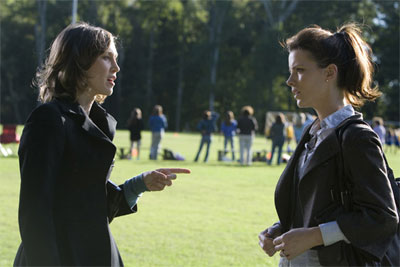 ROD LURIE: Well the truth of the matter is that the movie was written for somebody else and that somebody else wanted to do it. And we had to back away from that person for financial and ideological reasons. So the minute that that role was available, you know, there was an avalanche of actresses that wanted to play this role. It's rather unique, you know? It's a female role that's neither a superhero nor a wife, sort of a chicky - you know, a chicky chick. And Kate Beckinsale's agent calls me and recommends her. And my immediate reaction was, "She's too British, and I don't buy her as a Mom, and I'm not sure that I buy her as anything other than something glamorous." And she said, "Well, let me send you Snow Angels." So she sends me Snow Angels. And an hour into watching it, Paul, I called my assistant. I said, "I want you to get me as many of Kate Beckinsale's directors as you can," including Scorsese, right? And - thinking I'd never get him on the phone. But I had Marty on the phone within half an hour. And he was laying it on thick about what a great actress she was. And was shocked that I hadn't made a deal with her yet. And he told me to go do it immediately. So when the boss tells you to go hire somebody - you go hire her. So I made an appointment to see Kate and by the end of the day, we more or less had a deal to do a film.
ROD LURIE: Well the truth of the matter is that the movie was written for somebody else and that somebody else wanted to do it. And we had to back away from that person for financial and ideological reasons. So the minute that that role was available, you know, there was an avalanche of actresses that wanted to play this role. It's rather unique, you know? It's a female role that's neither a superhero nor a wife, sort of a chicky - you know, a chicky chick. And Kate Beckinsale's agent calls me and recommends her. And my immediate reaction was, "She's too British, and I don't buy her as a Mom, and I'm not sure that I buy her as anything other than something glamorous." And she said, "Well, let me send you Snow Angels." So she sends me Snow Angels. And an hour into watching it, Paul, I called my assistant. I said, "I want you to get me as many of Kate Beckinsale's directors as you can," including Scorsese, right? And - thinking I'd never get him on the phone. But I had Marty on the phone within half an hour. And he was laying it on thick about what a great actress she was. And was shocked that I hadn't made a deal with her yet. And he told me to go do it immediately. So when the boss tells you to go hire somebody - you go hire her. So I made an appointment to see Kate and by the end of the day, we more or less had a deal to do a film.QUESTION: You are renowned at delineating female characters. Why do you think you're so successful in doing that?
ROD LURIE: I just think people are not trying to do it. I just don't think that it's not commercial to make movies with female leads like that. You know? I think the head of Warner Brothers once said that he doesn't want to make a movie with a female lead any more, because they don't make money. So I'm not sure I'm better at it than most people. I just think that I'm one of few people actually trying to - trying to do it. I had a daughter, and she changed my life. I talk to her all the time and when I had my daughter, my relationship with my wife became better. You know, I think that once a man has a daughter, if he doesn't change as a man, he's not much of a man. I love and respect women. This all may be going away, because I'm doing this pilot for Showtime about a legal prostitute in Nevada, so maybe that may all go out the window very fast.
QUESTION: Well, let me ask you about Commander-In-Chief which began with huge numbers.
ROD LURIE: Right.
QUESTION: And strong reviews. And then it all seemed to go south for whatever reason that nobody seems to quite fathom.
ROD LURIE: I can tell you what happened. I think it's easy - I think it's easy, what happened, Paul, to be honest with you.
QUESTION: What happened?
ROD LURIE: Well, what happened is that I got fired, and they brought on Steven Bochco.
QUESTION: So what did you learn the most about the politics of television as a result of that experience?
ROD LURIE: I learned that you can never see it coming, that whatever anybody will tell you - I was a good boy, right? During that whole time, I barely said a word, other than being very positive about Steven, very positive about ABC or, Touchstone, in fact, rather than ABC, bbecause I wanted the show to have a successful transition, as much as I thought they were making a terrible, terrible mistake. And the show went off. And what Steve McPherson told me was that Steven Bochco promised to keep the show exactly the same. Well, if you're going to keep the show exactly the same, I don't know why you're replacing somebody. But that having been said, there's no way Steven Bochco's going to keep the show the same way. Steven Bochco's going to make it a Steven Bochco show, not a Rod Lurie show, so, he proceeded to eliminate one story line after another of mine, including the one that I had about a journalist being kept in jail for protecting a source. And he did things like, he brought in Geena's mother into the White House. In other words, he was going to make the show even older. We had the First Husband as a guy who was sort of the comic foil, because he's the First Lady, so he made him her principal advisor. And the person that she always had to turn to. In other words, he took a show, and what was a feminist show, he turned it into a show about why a woman should not be President. And the demos will show you that the women started going away in droves. Women couldn't stand to see their heroine behaving like this. And eventually, the show went from the number one new show to one of the lowest-rated shows. It was remarkable. It was a very sad period in my life.
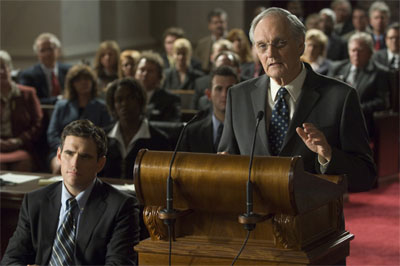 QUESTION: Did it make you cynical? Did it make you take a step back to look at what - how you approach things differently now?
QUESTION: Did it make you cynical? Did it make you take a step back to look at what - how you approach things differently now?ROD LURIE: Well, you know, it's not a business where anybody can be - anybody from the network side, I think, can be fully trusted, because everybody's looking to A, protect themselves and B, they're looking to be able to sleep at night. And I think what happened with Bochco, regardless of what you'll hear and regardless of what people will speculate, the reason why I was replaced was it became a number one new show. It was a gigantic success, critical hit. Golden Globe winner for Geena Davis. And ABC or Touchstone said, "We need to bring in a guy who really knows how to run a hit show, so that it won't go away." And they brought in Steven. You know? And it's a little karma for Steven, because he's become as famous for botching that show, as he has for anything else. I speak with a hard heart against Steven, because I was very good. I never said a bad thing. And then one day I open up Entertainment Weekly, and he is shitting on me left and right, you know? I think the show was doing so badly at that point, that he had to basically say, "It was so screwed up when I got here." You know, the point is, when - the first week the show was on the air, it was number one. The second week - number one for its time period. The second week, the ratings went higher. The third week, it went even higher - higher still. Then he comes on about the fourth week, and starts tinkering with the show, and starts to erode, little by little. But it was a really sad period in my life.
QUESTION: It's a pity. It's a really huge pity.
ROD LURIE: It was a huge pity and let me tell you something. From every - from a creative and financial point of view - I'm sure we would have still be on the air had I not left it.
QUESTION: Do you think you're a bit ahead of your time given recent political events this political season, over the last couple of years -
ROD LURIE: You want to be ahead of your time because you're either ahead of your time, or you're old news.
QUESTION: Are you shocked that or pleasantly surprised that we have an African-American as our next president?
ROD LURIE: Well, I'm not shocked. I mean, in the beginning it didn't seem possible. But, you know, you've gotten really used to it. You know, he was a year ahead of me in my high school.
QUESTION: Really?
ROD LURIE: Yeah. I did not know him, but, fun to look back. And I've been extremely supportive of the campaign. In fact, I was shocked. They did a list of the donors out in Pasadena where I live, and I was the number one financial donor to Obama. I don't want to be the number one financial anything donation-wise, to anybody, but I really believed, and do believe, in this man. And I think it's a remarkable thing. Had Hillary Clinton been the nominee, I would have waved the flag for her like I was in the cast of Les Miserables. But, you know, it wasn't to be the case.
QUESTION: Tell me about the Showtime series - and obviously, you have decided to return to television. What makes this experience going to be different, do you think?
ROD LURIE: Well, you know, Showtime is - they're unbelievably freeing. And writing the pilot has been an extraordinarily easy process with them, because they're filmmakers over there, and they're not bottom-lining it. It's really very interesting. And the show that I'm doing, it's very graphic, and it's about a woman who's a vice cop during the week and a legal prostitute on the weekends. And they've said, "Don't hold back." And boy, I sure didn't hold back.
QUESTION: How sexual is it going to be?
ROD LURIE: Very. I mean, not pornographic, but it's going to be very, very sexy. We won't see any nudity until the final scene, if I have my way. And then after that, I go do a remake of Straw Dogs.
QUESTION: How differently are you going to tackle this?
ROD LURIE: It's going to be different. It's going to be different in terms of a location, and in terms of the central themes. You know, there's no point in repeating the Sam Peckinpah. The only thing that I can do is take a story, and try to see if the same story can be mined for different themes. And, you know, that's what we're going to try to do. And I think it's going to be a very strong piece of entertainment, but it will be different than the Sam Peckinpah.
QUESTION: And you haven't cast either of these projects yet, have you?
ROD LURIE: No. You're going to be hearing about that casting probably by - the next two or three weeks. I know who's going to be in Hillary Jones, probably. But I haven't made that final decision yet. And the deal hasn't been made. And in terms of Straw Dogs, the agencies only got the screenplay yesterday.
QUESTION: So I'm sure you obviously don't regret not doing the junket round table circuit that you used to do.
ROD LURIE: Well, you know, I gotta tell you something. Those were the most fun days of my life. They really were. I had a fantastic time doing that. And I loved being a critic. I just wasn't very good at it.
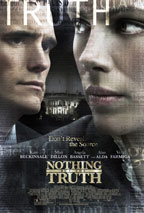
Nothing But the Truth
Starring: Kate Beckinsale, Matt Dillon, Angela Bassett, Alan Alda, Vera Farmiga, David Schwimmer, Courtney B. Vance, Noah Wyle, Floyd Abrams, Preston BaileyDirector: Rod Lurie
Genre: Dramas
Runtime: 1 hr 47 mins
Inspired by real-life political events, director Rod Lurie (THE CONTENDER) once again delves into issues of power and gender with NOTHING BUT THE TRUTH, an engaging thriller about the right to a... Inspired by real-life political events, director Rod Lurie (THE CONTENDER) once again delves into issues of power and gender with NOTHING BUT THE TRUTH, an engaging thriller about the right to a free press and the price of principles.
As the film opens, the president of the United States has survived an assassination attempt. Believing that the leader of Venezuela was behind the plot, the U.S. launches a military attack against the country. In Washington, D.C., reporter Rachel Armstrong (Kate Beckinsale) has revealed that Erica Van Doren (Vera Farmiga), the wife of the U.S. Ambassador to Venezuela, is a C.I.A. operative who found no proof of a plot. Armstrong quickly finds herself contending with both Van Doren and special prosecutor Patton DuBois (Matt Dillon), hellbent on discovering Armstrong's source.
When she refuses to reveal her source, Armstrong is jailed for contempt of court. In the troubled year that follows both women will confront the harsh realities of life during wartime, including the questioning of their patriotism and even threats to their lives. As a Supreme Court hearing draws near, and with her family cracking under the strain, Armstrong must decide whether her individual needs trump the importance of civil liberties.
Lurie ably balances the personal struggles with the political machinations, while Beckinsale and Farmiga compellingly convey each woman's strength of conviction. The result is a challenging, chillingly relevant cautionary tale about truth and consequences.
MORE
- Viggo Mortensen The Road
- 24 Cast Reunion
- Aaron Eckhardt No Reservations
- Aaron Eckhart The Dark Knight
- Adam McKay Step Brothers Interview
- Alan Alda Diminished Capacity Interview
- Alan Alda Diminished Capacity Interview
- Alex Dimitriades
- Al Pacino Oceans 13
- Alan Rickman Snow Cake
- Alan Rickman Sweeney Todd



